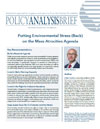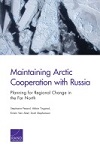-
Can Demographic-Environmental Stress Contribute to Mass Atrocities? And the Future of Arctic Cooperation
March 30, 2017 By Sara Merken In a brief published by the Stanley Foundation, Cullen Hendrix explores how “the degradation and overexploitation of renewable sources…and unequal access to these resources” can make societies more or less susceptible to experiencing mass atrocities. Hendrix proposes that “demographic-environmental stress” is most likely to contribute to mass atrocities (genocide, war crimes, or crimes against humanity) in agricultural societies that have a high level of group identity-driven politics and economics, exclusionary political institutions, political actors that deprive certain groups, or when governments have low legitimacy. Rwanda and Darfur are prominent examples of places where resource conflict resulted in large-scale killings. Hendrix recommends investing in early warning capabilities, building a research agenda focused on mass atrocities, maintaining an open space for civil society and the media, and addressing land pressures and land tenure reforms to reduce dangers in vulnerable societies.
In a brief published by the Stanley Foundation, Cullen Hendrix explores how “the degradation and overexploitation of renewable sources…and unequal access to these resources” can make societies more or less susceptible to experiencing mass atrocities. Hendrix proposes that “demographic-environmental stress” is most likely to contribute to mass atrocities (genocide, war crimes, or crimes against humanity) in agricultural societies that have a high level of group identity-driven politics and economics, exclusionary political institutions, political actors that deprive certain groups, or when governments have low legitimacy. Rwanda and Darfur are prominent examples of places where resource conflict resulted in large-scale killings. Hendrix recommends investing in early warning capabilities, building a research agenda focused on mass atrocities, maintaining an open space for civil society and the media, and addressing land pressures and land tenure reforms to reduce dangers in vulnerable societies. In a report for the RAND Corporation, Stephanie Pezard, Abbie Tingstad, Kristin Van Abel, and Scott Stephenson analyze transformations in the Arctic that may impact Russia’s incentives to cooperate in the region. Upcoming changes may disrupt a pattern of peaceful cooperation that has prevailed for decades in the polar region. The four main transformations are geographic and climate changes that will modify maritime access, increased international competition for the Arctic’s resources, increased NATO presence in the region that Russia may see as a military threat, and pending legal decisions about claims submitted by Russia, Canada, and Denmark. Diminishing sea ice is expected to lead to increased ship traffic in the summer and global interest in exploiting oil and gas resources. U.S. policy options for mitigating the impacts of these tensions include increasing funding for Arctic domain awareness projects, avoiding “accidental escalation of small-scale incidents,” balancing NATO’s position of supporting Arctic without creating tensions with its presence there, and keeping Russia accountable to its UN Convention on the Law of the Sea commitments by joining the convention.
In a report for the RAND Corporation, Stephanie Pezard, Abbie Tingstad, Kristin Van Abel, and Scott Stephenson analyze transformations in the Arctic that may impact Russia’s incentives to cooperate in the region. Upcoming changes may disrupt a pattern of peaceful cooperation that has prevailed for decades in the polar region. The four main transformations are geographic and climate changes that will modify maritime access, increased international competition for the Arctic’s resources, increased NATO presence in the region that Russia may see as a military threat, and pending legal decisions about claims submitted by Russia, Canada, and Denmark. Diminishing sea ice is expected to lead to increased ship traffic in the summer and global interest in exploiting oil and gas resources. U.S. policy options for mitigating the impacts of these tensions include increasing funding for Arctic domain awareness projects, avoiding “accidental escalation of small-scale incidents,” balancing NATO’s position of supporting Arctic without creating tensions with its presence there, and keeping Russia accountable to its UN Convention on the Law of the Sea commitments by joining the convention.Sources: RAND Corporation, Stanley Foundation.
 A Publication of the Stimson Center.
A Publication of the Stimson Center.





